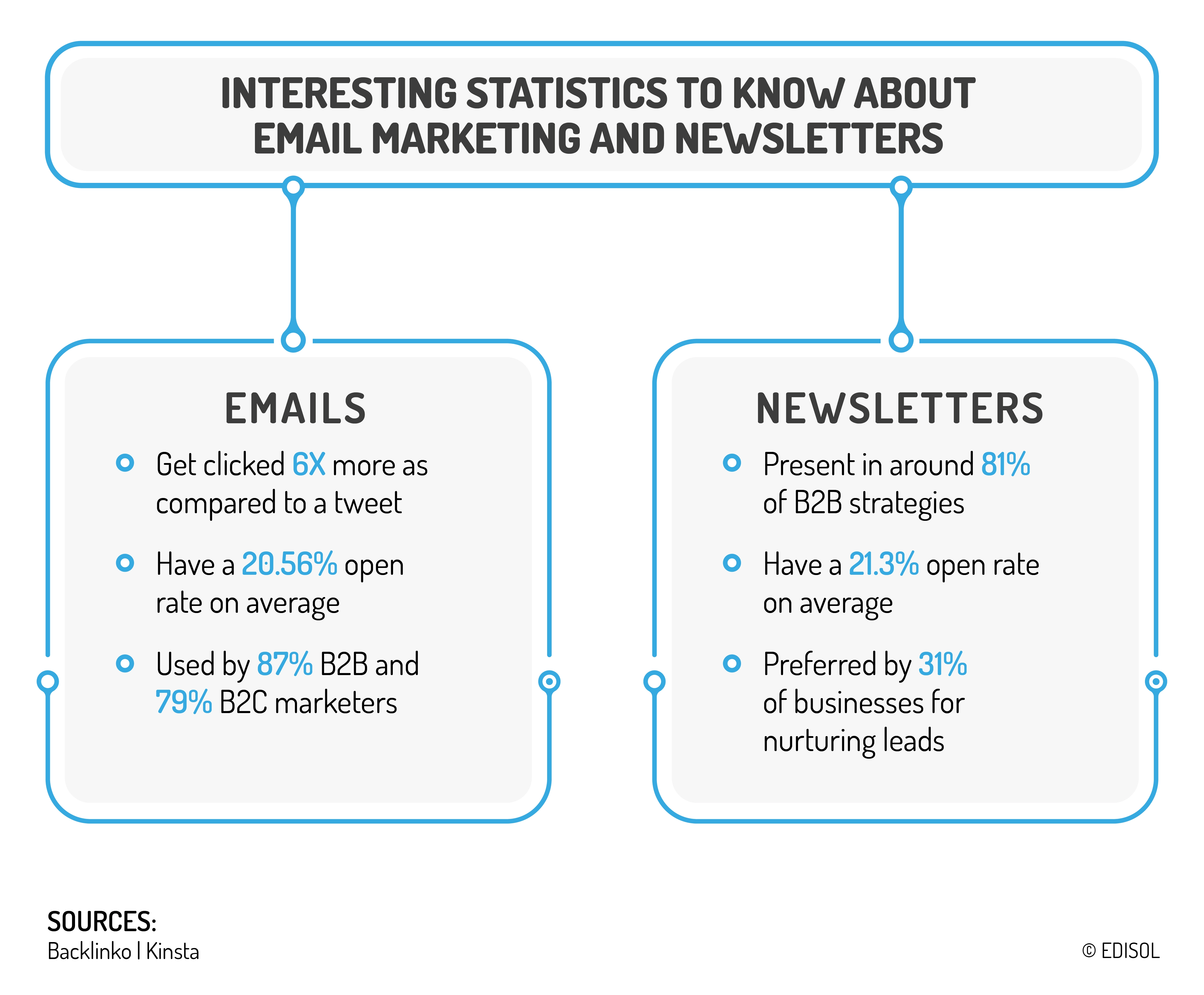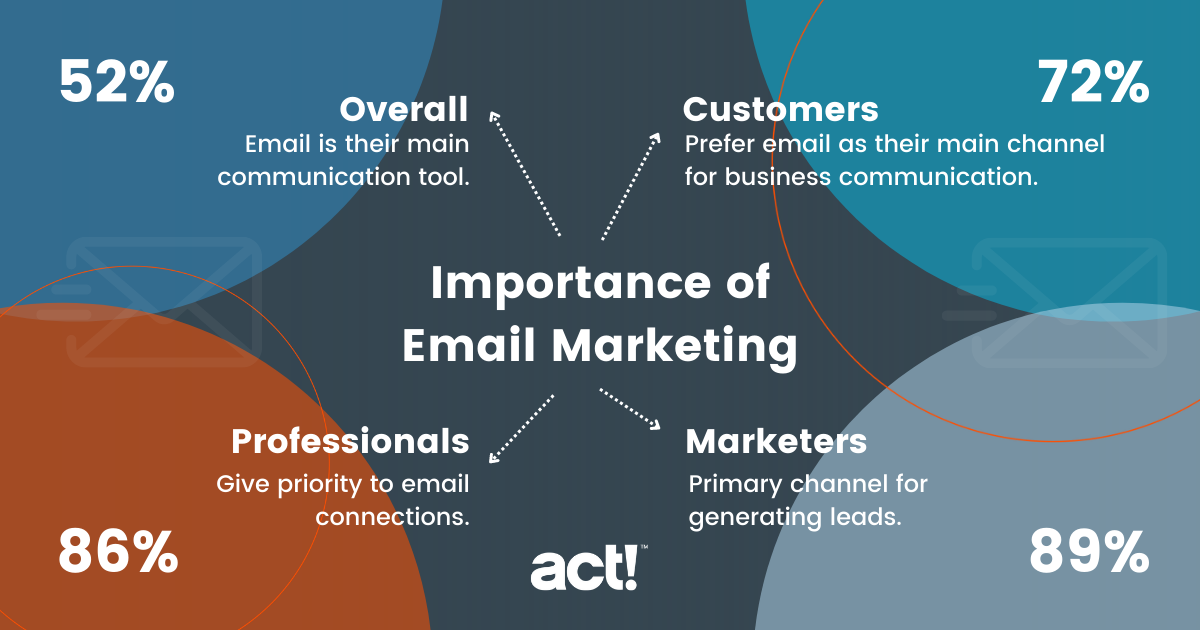Email marketing involves sending targeted messages to potential and current customers via email. It’s a powerful tool for businesses to connect with their audience.
In today’s digital age, email marketing stands out as a crucial strategy. It allows businesses to reach their audience directly, offering a personal touch. With the rise of social media, some may think email is outdated. But email marketing remains effective.
It provides a way to share updates, promotions, and build relationships. For businesses, it means better engagement and higher conversion rates. It’s cost-effective and easy to track, making it a smart choice for any marketing plan. Understanding its importance can help businesses thrive in a competitive market. Let’s dive into what makes email marketing essential for success.
Introduction To Email Marketing
Email marketing is a powerful tool for businesses. It helps connect with customers directly. This section will introduce you to email marketing, its definition, and its historical background. Understanding these basics can help you see why email marketing is essential.
Definition
Email marketing involves sending emails to a list of subscribers. These emails can promote products, share news, or offer valuable content. The goal is to build relationships and drive sales. It is one of the most cost-effective marketing strategies. With email marketing, businesses can reach a large audience quickly. It allows for personalized communication, making it more effective.
Historical Background
Email marketing has been around since the 1970s. Gary Thuerk, a marketer at Digital Equipment Corporation, sent the first email blast in 1978. He sent it to 400 potential clients. This campaign generated $13 million in sales. This success showed the potential of email marketing.
In the early days, email marketing was simple. Businesses sent basic text emails. As technology advanced, so did email marketing. HTML emails allowed for images and links. This made emails more engaging. Over time, laws like the CAN-SPAM Act were introduced. These laws ensured that marketers followed ethical practices. Today, email marketing is a sophisticated tool. Marketers use data to personalize and segment their emails.
Benefits For Businesses
Email marketing offers a range of benefits for businesses. It helps companies connect directly with their audience. This method provides a personal touch. Let’s explore some key advantages.
Cost-effectiveness
Email marketing is budget-friendly. It requires minimal investment. No need for expensive ads or printing costs. Businesses can create campaigns using email software. These tools are often affordable. They offer various templates and features. This makes creating emails easy and fast.
Small businesses benefit greatly. They can reach their audience without breaking the bank. With email marketing, businesses save money while reaching many customers. This efficiency helps companies grow.
High Roi
Email marketing delivers a high return on investment (ROI). It is one of the most effective marketing strategies. Studies show that for every dollar spent, businesses can earn a substantial return. This makes email marketing very appealing.
Emails can drive sales and conversions. They can promote products, offer discounts, and engage customers. This leads to increased revenue. Effective emails can turn prospects into loyal customers. Businesses see immediate results from their campaigns. This high ROI makes email marketing a must for any business.
Building An Email List
Building an email list is crucial for any business. It allows direct communication with potential and existing customers. Email marketing can increase customer engagement, drive sales, and build brand loyalty.
Strategies
Effective strategies for building an email list include:
- Offering incentives: Provide discounts, freebies, or exclusive content in exchange for email sign-ups.
- Creating engaging content: Write valuable content that encourages readers to subscribe for more.
- Using sign-up forms: Place sign-up forms on your website, blog, and social media pages.
- Hosting webinars: Invite people to sign up for informative webinars and collect their emails.
- Running contests: Host contests or giveaways that require an email address to enter.
Best Practices
Following best practices ensures your email list grows effectively and ethically:
- Double opt-in: Use double opt-in to confirm subscribers’ interest and avoid spam complaints.
- Clear privacy policy: Inform subscribers how their data will be used and protected.
- Segment your list: Divide your list into segments based on interests or behavior for targeted campaigns.
- Regular engagement: Send regular, valuable content to keep subscribers engaged and reduce unsubscribes.
- Easy unsubscribe: Provide an easy way for users to unsubscribe if they no longer wish to receive emails.
By following these strategies and best practices, you can build a strong and engaged email list that supports your business goals.
Credit: fluentcrm.com
Crafting Effective Emails
Creating effective emails is crucial for successful email marketing. Well-crafted emails can grab attention, build trust, and drive action. Let’s explore the key elements of effective email creation.
Engaging Subject Lines
The subject line is the first thing your audience sees. An engaging subject line can increase open rates. Keep it short and clear. Use action words to create curiosity. Ask questions or make bold statements. Avoid spammy words like “free” or “urgent.” Test different subject lines to see what works best.
Personalization
Personalization makes your emails feel more relevant. Use the recipient’s name. Mention past purchases or interests. Segment your audience based on behavior. Send tailored content that meets their needs. Personalized emails can boost engagement and conversion rates. Always aim to make each email feel unique and valuable.
Types Of Email Campaigns
Email marketing is a powerful tool for businesses. There are different types of email campaigns that can help you achieve various goals. By understanding these types, you can choose the best one for your needs. Let’s explore the common types of email campaigns.
Newsletters
Newsletters are regular emails sent to your subscribers. They keep your audience updated with your latest news, blog posts, or other content. Newsletters help build a relationship with your subscribers. They offer valuable information and keep your brand top of mind.
Some benefits of newsletters include:
- Building brand loyalty
- Increasing website traffic
- Sharing company updates
- Promoting new products or services
To create an effective newsletter, focus on high-quality content. Include engaging visuals and clear calls-to-action (CTAs).
Promotional Emails
Promotional emails are designed to drive sales and revenue. They highlight special offers, discounts, or new products. Promotional emails aim to encourage your subscribers to make a purchase.
Common elements of promotional emails include:
- Compelling subject lines
- Clear and concise messages
- Strong CTAs
- Eye-catching visuals
Promotional emails can be highly effective when tailored to your audience’s interests. Personalization and segmentation can boost their success.
In summary, newsletters and promotional emails are two essential types of email campaigns. Each serves a unique purpose and can help you achieve your marketing goals. Use them wisely to connect with your audience and grow your business.
Analyzing Email Performance
Analyzing email performance is crucial for understanding the effectiveness of your campaigns. It helps you see what works and what needs improvement. By tracking key metrics, you can refine your strategies and achieve better results. This section explores the essential aspects of analyzing email performance.
Key Metrics
Key metrics provide insights into the success of your email campaigns. These include:
- Open Rate: The percentage of recipients who open your email.
- Click-Through Rate (CTR): The percentage of recipients who click on links within your email.
- Bounce Rate: The percentage of emails that were not delivered.
- Conversion Rate: The percentage of recipients who complete a desired action.
- Unsubscribe Rate: The percentage of recipients who opt out of your email list.
Monitoring these metrics helps you gauge the performance of your email marketing efforts.
Tools And Software
Several tools and software can help you analyze email performance. These tools provide detailed reports and insights. Some popular options include:
- Mailchimp: Offers comprehensive email tracking features.
- Constant Contact: Provides robust analytics and reporting.
- Sendinblue: Includes advanced reporting tools.
- Campaign Monitor: Delivers detailed performance metrics.
- HubSpot: Integrates email tracking with other marketing data.
Using these tools, you can analyze your email campaigns effectively. This helps in making informed decisions to enhance your email marketing strategy.
Compliance And Regulations
Email marketing is a powerful tool for businesses. But, it comes with its own set of rules. Compliance and regulations ensure that email marketing is done ethically and legally. It’s crucial to understand these rules to avoid fines and build trust with your audience.
Gdpr
The General Data Protection Regulation (GDPR) is a law in the European Union. It protects the privacy and data of EU citizens. Businesses must get clear consent before sending emails to individuals.
- Explicit Consent: Users must actively opt-in to receive emails.
- Data Protection: Companies must protect the data they collect.
- Right to Access: Users can request to see their data.
Non-compliance with GDPR can lead to heavy fines. It’s essential to follow these guidelines to maintain trust and avoid penalties.
Can-spam Act
The CAN-SPAM Act is a US law that sets rules for commercial emails. It gives recipients the right to stop receiving emails and outlines penalties for violations.
- Honest Subject Lines: Do not use misleading information.
- Identify Ads: Clearly label the email as an advertisement.
- Include Physical Address: Provide your business address in the email.
- Opt-Out Option: Include a way for recipients to unsubscribe.
Following the CAN-SPAM Act helps build a good reputation and avoids legal trouble. It ensures that email marketing is respectful and transparent.

Credit: www.linkedin.com
Future Trends In Email Marketing
The future of email marketing looks bright with emerging trends. Businesses must adapt to stay competitive. Let’s explore some key trends shaping this space.
Automation
Email automation is becoming more advanced. It helps businesses send the right message at the right time. Automated emails can be triggered by user actions. This includes welcome emails, cart reminders, or re-engagement campaigns. Automation saves time and ensures consistency. It also improves customer experience. Businesses can tailor messages based on user behavior. This leads to higher engagement and conversion rates.
Ai Integration
Artificial Intelligence is transforming email marketing. AI can analyze vast amounts of data quickly. It helps in creating personalized content for each user. This improves open and click-through rates. AI can also predict the best times to send emails. It can segment audiences more effectively. This ensures that each user gets relevant content. AI tools can even write email copy and subject lines. This makes the process more efficient. Businesses using AI can gain a competitive edge.

Credit: edisolonline.com
Frequently Asked Questions
What Is Email Marketing?
Email marketing is sending promotional messages to a group of people via email. It’s used to engage customers.
Why Is Email Marketing Important For Businesses?
Email marketing helps businesses reach customers directly. It can increase sales, build loyalty, and promote products.
How Does Email Marketing Work?
Email marketing involves sending emails to a list of subscribers. These emails can include offers, updates, or newsletters.
What Are The Benefits Of Email Marketing?
Email marketing is cost-effective, targeted, and measurable. It helps businesses connect with their audience and drive sales.
How Can Businesses Start Email Marketing?
Businesses can start by collecting email addresses. Use sign-up forms, create compelling content, and send regular emails.
Conclusion
Email marketing is crucial for business growth. It fosters strong customer relationships. Direct communication builds trust and loyalty. Businesses can target specific audiences easily. This leads to higher engagement and conversions. It’s cost-effective, making it ideal for all businesses. Also, it provides measurable results.
You can track open rates and clicks. This helps refine strategies over time. Ignore email marketing and miss opportunities. Start today and see the benefits. Effective email marketing can transform your business.


Leave a Reply